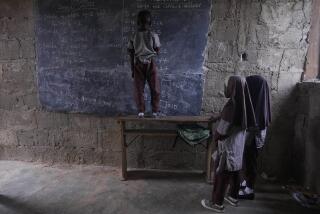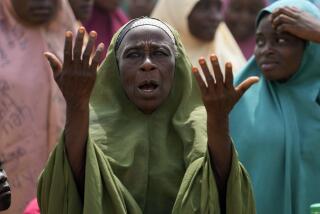Nigeria Slowly Sheds Military Legacy
ENUGU, Nigeria â At the end of a tiring day in this bustling city, people used to rush to the one northern suburb to be home by 8 p.m. Delay meant a long detour. The main road to their neighborhood ran past military barracks, and at that hour, an imposing iron gate swung shut. Intimidating armed soldiers stood guard.
During years of military rule, timid pleas to remove the gate fell on deaf ears. With the installation of a civilian administration almost two years ago, there were further requests. Last year, the gate finally came down.
For many people, that event symbolized the end of a system that stifled civil liberties and prevented political and economic progress.
âThere is a very visible shift from military to civilian rule,â said Adaokere Agbasimalo, program officer for the local branch of the Johns Hopkins University Center for Communications Programs in this southeastern Nigerian city. âThe military men would intimidate people. Everything was [achieved] through fear. Now people are free to express their views.â
Freedom has flourished under President Olusegun Obasanjo, but corruption and lavish spending are still rampant. Obasanjoâs administration is facing mounting criticism from a population beaten down by power outages, spotty telephone service, economic stagnation and the absence of reliable social services.
The worldâs sixth-largest oil exporter, Nigeria is also reeling from its worst energy crisis in a decade. Gas stations across this country of 110 million people are empty. The shortages are being blamed largely on the dire state of four refineries that were neglected by the former military rulers.
Obasanjo wants to deregulate prices for petroleum products, ending costly subsidies in an effort to attract private investment and correct distortions in the economy. But labor unions say that the move would send gas prices out of the reach of ordinary people.
âThe enthusiasm [for Obasanjo] has waned,â said Chekwas Okorie, an Enugu businessman and longtime political activist who campaigned for Obasanjo in 1999. âWe had so many years of military rule that when we got into a real transition [to democracy], there was so much expectation. Obasanjo made a lot of promises. We believed him. We thought he would understand the problems of the people, the downtrodden.â
Obasanjo has promised to privatize state-run utilities and other assets, which were plundered by past regimes. But progress has been slow. The president has not been able to end corruption, which local economists estimate adds about 30% to the cost of doing business.
Once up and running, many local ventures struggle to keep afloat because of poor infrastructure.
The lack of consistent electricity has forced businessman Tony Okeke to install two generators to run Zodiac Hotels Limited in Enugu. No water from the cityâs mains means that he has to use his own tanker to haul it from the river, and then treat it and pump it himself at a cost of thousands of dollars a month.
âGovernment isnât addressing the situation and the problems of its abandoned projects,â Okeke said. âEvery government wants to start its own project for which it will be remembered. Why not build on what you have? Why not have a culture of maintenance?â
Part of the reason may be that the legislature, frequently embroiled in scandal, has been too busy getting its own house in order.
Since May 1999, the Senate has twice impeached its own president, who is the countryâs third-ranking official. It has also sacked other leaders of the upper house on graft-related charges.
Obasanjo has argued that Nigeriaâs problems are a consequence of the rampant corruption and mismanagement that characterized decades of military rule. He has established an anti-corruption agency. In January, he dismissed one minister and one deputy minister who were accused of graft and incompetence, and directed all ministries and state enterprises to establish anti-corruption units.
But so far no senior official has been prosecuted or jailed on corruption charges.
âThe problem is not with corruption, the problem is with punishing corruption,â said Abdul Oroh, executive director of the Civil Liberties Organization, based in Lagos, Nigeriaâs commercial capital and a traditional hotbed of opposition politics. âThere is the question of who will cast the first stone.â
âBecause we are a society governed by big symbols, a Big Man is important and is not expected to go to jail,â said Chidi Amuta, a media consultant.
In February, Obasanjo announced a new Cabinet and threatened to throw out anyone involved in financial misdeeds. But critics say that some of the newcomers lack experience and that others are political has-beens.
Critics also cite legislatorsâ questionable spending priorities.
A new soccer stadium that is going up near the capital, Abuja, is expected to cost about $374 million--reportedly twice the amount budgeted for Nigeriaâs health care this year. The government argues that it needs the stadium to host the 2003 All-Africa Games.
In addition, the Senate recently proposed the purchase of eight executive jets to meet the needs of the president, vice president and other federal functionaries--at a cost of about $152 million.
Obasanjo has also come under fire for doing little to enforce the rule of law following the introduction of Sharia (Islamic law) by several predominantly Muslim northern states. The resulting religious clashes in the north and ethnic violence in Lagos claimed more than 1,000 lives last year.
The president rejected calls to seek a judicial ruling on the constitutionality of Sharia, arguing that such a decision would further inflame passions.
Still, even the most hardened skeptics acknowledge that an imperfect civilian administration is far preferable to soldiers at the helm. And although many Nigerians are disappointed, they remain tolerant.
âThe problems are obviously still there, but no one is talking about a military takeover,â Oroh said. âThere is still some hope that things may get better.â
More to Read
Sign up for Essential California
The most important California stories and recommendations in your inbox every morning.
You may occasionally receive promotional content from the Los Angeles Times.











